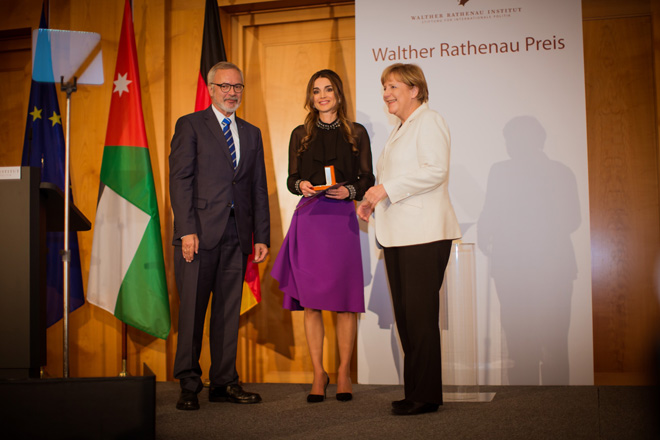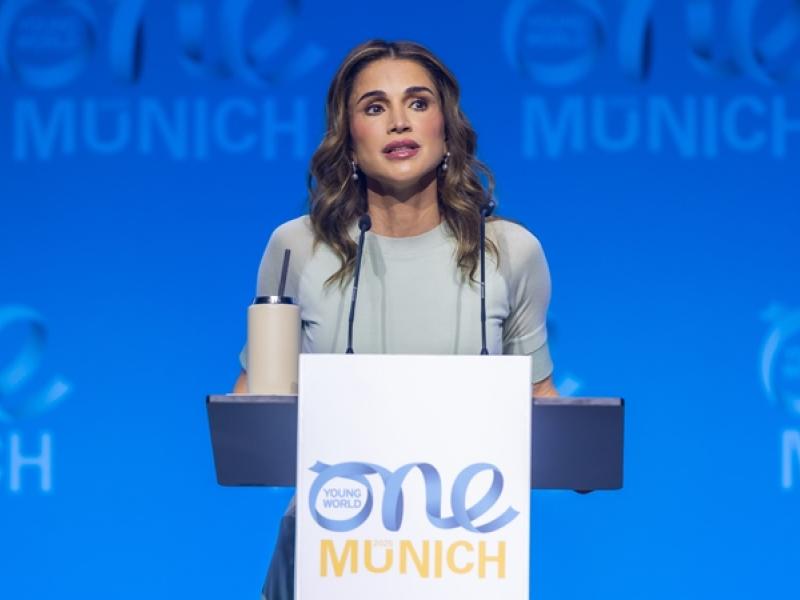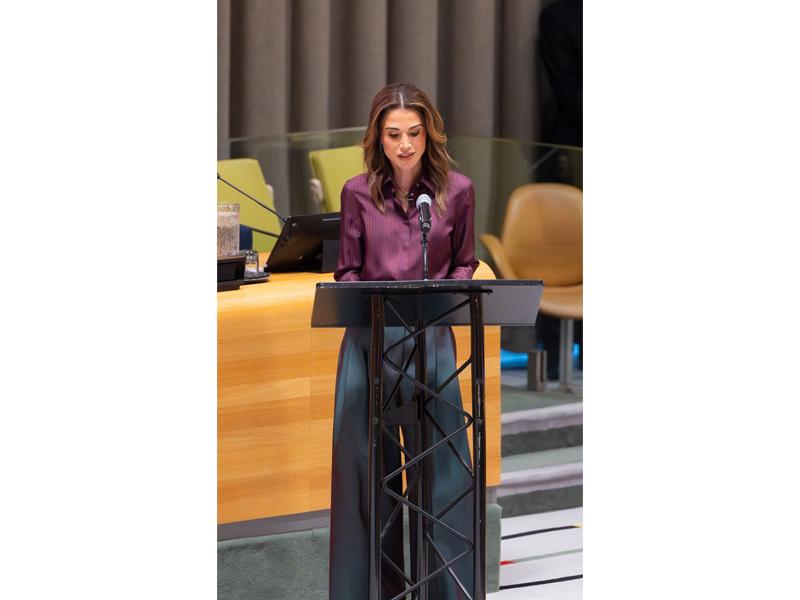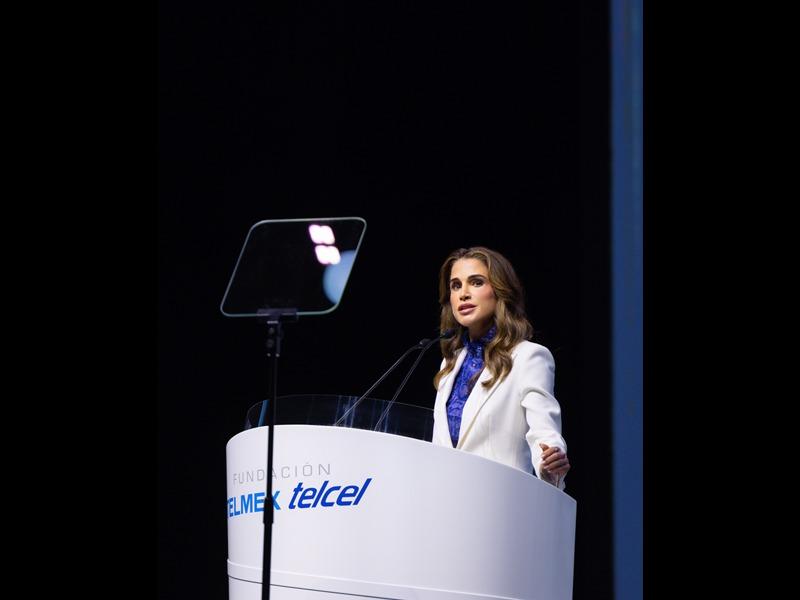Chancellor Merkel, Mr. Steinlein, Dr. Hoyer, ladies and gentlemen,
Thank you for your kind words and for this great honor. I am humbled to accept this prize. And I do so on behalf of the people of Jordan who, everyday, through their words and actions, demonstrate the values that defined the life of Walther Rathenau.
Values such as courage and compassion. Equality and understanding. Tolerance and mutual respect. In other words, basic human decency.
They’re values that our two nations share; the lynchpin of the lasting friendship between our people. Never more so than today when our two nations find themselves at the forefront of a tragic humanitarian emergency. I’m talking, of course, about the exodus of thousands of Syrian refugees desperately seeking safety, sanctuary and support.
The reaction to this catastrophe by the people of Germany…by the German government…and, by you, Chancellor Merkel, truly honours the memory of Walther Rathenau and breathes new life into his legacy.
Imagine Rathenau’s pride at the surge of volunteerism as Germans offer their time and energies to alleviate the suffering of others.
Or the generosity of spirit we’ve seen as Germans donate goods to help Syrians who arrive with nothing but the clothes on their back.
Or the Refugees Welcome initiative which matches refugees with German citizens willing to share their homes.
The people of Germany are doing something that the author J.K. Rowling once described as “…thinking themselves into other people’s minds” and imagining themselves in “other people’s places.”
They are imagining what the refugees have endured and what they have lost. How exhausted they must be after long and dangerous journeys. They are imagining the anxiety of a mother clutching her baby. Or the bewilderment of a grandfather who doesn’t speak German. And by thinking themselves into the minds of those Syrians, the instinct to help took over. It’s basic human decency.
My late father in law, King Hussein, a man who personified humility and compassion, never made a decision before, metaphorically, ‘stepping into other people’s shoes’. And although they are large shoes to fill, I am inspired by my husband, King Abdullah, and the people of Jordan who embody this legacy. A legacy that guides humanitarian policy in Jordan to this day. At present, our small country hosts 1.4 million Syrians. 20% of our population. This, despite the fact, that we’re burdened by poverty and unemployment. Still, we do our best with what we have. And I could not be more proud of the selflessness and kindness of Jordanians.
So that Syrian children could continue their education and heal, we opened our classroom doors. Extended school hours. And many of our teachers worked double shifts.
So that Syrians could have shelter and recover from the trauma of conflict, Jordanians welcomed refugees into their towns. And supported them in practical ways…with countless acts of kindness.
So that Syrians’ problems were not made worse by ill health, we, in partnership with the UN, have allowed them access to free healthcare, including public hospitals.
And, next week, as we celebrate the Muslim holiday of Eid al-Adha, I know that those blessed with good fortune will share what they have with those who have lost so much.
It’s about empathy. Without empathy there can be no compassion. And without compassion, we weaken the very foundations of our common humanity.
In a world of insta- 24/7 connections, where nothing remains ‘local’, where a distant crisis can make its way to our doorstep, and where a conversation anywhere can resonate everywhere, basic human decency is the strongest currency our global family has.
Yet, in too many places, I fear it’s being devalued. Sometimes through the destructive and misleading power of a simple word. Use a headline… hashtag…or sound bite often enough and it will work its way into our mindsets. Whether it’s right or not.
Here’s an example: refugee or migrant?
You could be forgiven for thinking they’re one and the same because they seem to be used interchangeably.
But they’re not the same.
Migrants choose to move for any number of reasons: for work, for education, to reunify their family. Migrants can choose to return home and they will still have a government to protect them.
Refugees are people fleeing war or persecution across an international border. They have no choice but to run for their lives. And, thus, they are entitled, under international law, to protection and asylum. To justice and dignity.
Instead, we’re confronted with shocking and heartbreaking scenes. Seas strewn with bodies. Make-shift camps. Desert graves. Trucks turned to deathbeds. And the defining image of this tragedy, dead children washed up on the shore. The flotsam and jetsam of a conflict they were too young to understand.
Rather than evoke an unprecedented tide of human kindness, some segments of society have, instead, unleashed a new and ugly lexicon in our newsfeeds.
Where once the word “refugee” rightly aroused feelings of empathy and compassion, now, refugees and migrants have been merged. Stripped of their true definitions, they are referred to with blunt pejoratives, as if some lives have lesser value than others.
Invaders. Marauding foreigners. And worse.
It reminds me of some graffiti by the British artist, Banksy, who wrote on a wall: I see humans but no humanity.
Because not only do these labels not begin to describe the horrors refugees have endured but there’s evidence to suggest that such language influences the way we think – in subtle ways. Ways we might not even be aware of.
And that is the real danger. That, over time, labels obscure a person’s humanity, and allow suspicion to creep in and intolerance to build. Fear to take root and walls to go up. Each sideways glance, each derogatory comment, each label… eroding our most precious commodity: basic human decency.
Ladies and gentlemen, being caught in a war doesn’t make people less deserving of human kindness; it makes them all the more reliant on it!
Here’s another two words that are often misused, with equally devastating consequences. Muslim and extremist.
One is a follower of Islam, my beloved religion of peace, compassion and understanding. The other is irreligious, evil and has no regard for the sanctity of human life.
The two are not related. In fact, they could not be further apart. But, many continue to use such phrases as “Muslim extremist” or “Islamic terrorist”. Labels that not only carry assumptions about the character of millions of good and decent people, but that set in motion a downward spiral of mistrust and miscommunication.
But look beyond the label and we quickly realize that we are more alike than we are different.
Look beyond “Muslim” to see a caring father. Beyond “Sunni” or “Shia” to see a loving husband. Look beyond the name, “Abdullah Kurdi,” to see a courageous man who was just trying to keep his family safe by fleeing war-torn Syria. His wife and children drowned. A tidal wave of despair washed three year old Aylan, and his five year old brother, Galib, to the shore.
The image of Aylan is forever seared into our consciences. Long may it stay there. And let it remind us that no matter where we come from… how we dress…or what language we speak. Who we worship or how we got here. That, in the end, we share the same dreams and want the same things: Safety and security for our loved ones. Happy, thriving children. A sense of accomplishment at the end of the day. And the belief that if we imagine a better, more prosperous future, we can achieve it.
But to find lasting solutions to this crisis we must follow King Hussein’s example, and view the crisis from the vantage point of Europeans as well.
Many, not unreasonably, may see refugees landing at their shores and borders as ‘strangers’. Destitute people from a different country…who speak a different language… and follow a different faith. For some, they may seem more than just ‘strangers’…but rather ‘threats’. Threats to their beliefs and way of life and a strain on their economy and social services. Maybe even a risk to their security. Their instinct may be to “bolt the door”, not out of malice but out of fear of the unknown.
This is where we must all work together. Urgently. Compassion and courage alongside pragmatism. It’s about helping people in host communities understand what refugees want more than anything: shelter, safety and peace. Because those are the very things they were denied in the countries from which they came.
Today, we face a crisis of exceptional magnitude. One that demands exceptional solutions. Piecemeal measures won’t work. Rather, this is an opportunity for the global community: Europe, the Middle East and the rest of the world, to devise a cohesive and comprehensive policy that serves the interests of all.
It’s not about ‘whether nations should accept refugees’ or ‘which nations should accept refugees’. But, rather, a collective response. A response that begins with ‘what practical measures can we take together?’
Can we, for example, work with governments, UNHCR and NGOs to identify and register refugees? Find resources, as Germany is doing, to provide reception centers, shelter? Provide language lessons…schooling…and job training to help refugees recover so that when the time is right, they can return home to rebuild their shattered lives.
The alternative serves the interest of no-one. To do nothing would be an unforgiveable failure that calls into question the very phrase “global family”. Denying refugees their basic rights risks creating a defeated and disillusioned generation who, at their most desperate, could be susceptible to extremists’ ideology.
Ladies and gentlemen, we live at a time where disruption, creative or destructive, technological, demographic or ideological is a defining feature of our world. Regardless of what form it takes, disruption pushes us outside our comfort zone. Those who’ve been there know that it is the place where we truly feel alive. Where we redefine the boundaries of what is ‘possible’ and where the exhilaration and rawness of emotions empower us to break away from hard-wired patterns of belief and behavior. It is where our creativity is unleashed, our vision expanded, and our hearts opened. From that place, let us all imagine a sustainable solution to the crisis we face today, one that honors the phrase ‘global family’.
So, thank you Chancellor Merkel for your inspired leadership and courage. And thank you to the people of Germany, Jordan and others who have extended the hand of humanity to strangers in need.
As difficult as it is, I hope this tragedy can be a force for good. An opportunity for everyone involved in this crisis to do the right thing. To imagine ourselves into each other’s places, to step into others people’s shoes and to venture outside our comfort zones.
Let that be the legacy of little Aylan: a tide of human kindness lapping gently at our shores and at our borders.
-------------------------------------------------------------------------------------------------------------
German translation:
Frau Bundeskanzlerin Merkel, Herr Steinlein, Herr Dr. Hoyer, meine Damen und Herren,
für ihre freundlichen Worte und für diese große Ehre danke ich Ihnen sehr. Demütig nehme ich diesen Preis an. Ich tue dies im Namen des Volkes von Jordanien, das täglich, durch Worte und Taten, die Werte, die das Leben Walther Rathenau‘s definierten, demonstriert.
Werte wie Mut und Mitgefühl. Gleichheit und Verständnis. Toleranz und gegenseitiger Respekt. Mit anderen Worten, grundlegender menschlicher Anstand.
Das sind Werte, die unsere beiden Nationen teilen; der Dreh- und Angelpunkt der andauernden Freundschaft zwischen den beiden Völkern. Heute mehr als je zuvor, wo sich beide Nationen an der Spitze einer tragischen humanitären Notlage befinden. Ich spreche natürlich vom Exodus Tausender syrischer Flüchtlinge, verzweifelt nach Sicherheit, Zuflucht und Unterstützung suchend.
Die verschiedenen Reaktionen auf diese Katastrophe... die Reaktionen der Menschen in Deutschland ... der Bundesregierung ... und von Ihnen, Frau Bundeskanzlerin, diese Reaktionen ehren wahrhaftig das Andenken an Walther Rathenau und hauchen neues Leben in sein Vermächtnis ein.
Stellen Sie sich Rathenau‘s Stolz auf den massiven Anstieg der Freiwilligenarbeit vor, während die Deutschen ihre Zeit und Energie anbieten, um das Leiden anderer zu lindern.
Oder die Großzügigkeit des Geistes, in dem die Deutschen Sachspenden leisten um Syrern zu helfen, die nur mit dem ankommen, was sie am Leibe tragen.
Oder die Refugees Welcome Initiative, die deutschen Bürgern, die bereit sind ihr Zuhause zu teilen, Flüchtlinge zuordnet.
Die deutsche Bevölkerung tut etwas, was die Autorin J. K. Rowling einmal wie folgt beschrieb: „...denken sich in die Köpfe anderer Menschen“ und versetzen sich „ in anderer Menschen Lage“ hinein.
Sie stellen sich vor, was die Flüchtlinge ertragen und was sie verloren haben. Wie erschöpft sie durch lange und gefährliche Reisen sein müssen. Sie stellen sich die Angst einer Mutter vor, während sie ihr Baby umklammert. Oder die Fassungslosigkeit eines Großvaters, der kein Deutsch spricht. Und dadurch, dass sie sich in die Köpfe der Syrer hineinversetzt haben, übernahm der Instinkt zu helfen. Das ist grundlegender menschlicher Anstand.
Mein verstorbener Schwiegervater, König Hussein, ein Mann, der Demut und Barmherzigkeit verkörperte, traf nie eine Entscheidung ohne vorher bildlich „in den Schuhen Anderer zu laufen“. Obwohl dies sehr große Schuhe sind, bin ich von meinem Ehemann, König Abdullah, und den Menschen von Jordanien, die dieses Erbe verkörpern, inspiriert. Ein Erbe, welches bis zum heutigen Tag die humanitäre Politik in Jordanien leitet. Derzeit beherbergt unser kleines Land 1,4 Millionen Syrer. 20% unserer Bevölkerung. Dies trotz der Tatsache, dass wir von Armut und Arbeitslosigkeit belastet sind. Trotzdem tun wir unser Bestes mit dem, was wir haben. Und ich könnte nicht stolzer auf die Selbstlosigkeit und Güte der Jordanier sein.
Damit syrische Kinder ihre Ausbildung fortzsetzen und zur Ruhe kommen können, öffneten wir unsere Klassenzimmer. Erweiterten die Schulstunden. Und viele unserer Lehrer arbeiteten in Doppelschichten.
Damit Syrer Unterschlupf finden und sich vom Trauma des Konflikts erholen können, begrüßten Jordanier Flüchtlinge in ihren Städten. Und unterstützten sie in praktischen Weisen ... mit zahllosen Handlungen der Güte.
Damit sich die Probleme der Syrer nicht noch zusätzlich durch Krankheiten verschlechterten, haben wir ihnen, in Zusammenarbeit mit den Vereinten Nationen, Zugang zu kostenloser Gesundheitsversorgung ermöglicht, einschließlich der öffentlichen Krankenhäuser.
Nächste Woche, während wir den muslimischen Feiertag Eid al-Adha begehen, weiss ich, dass diejenigen, die mit Glück gesegnet sind, das was sie haben mit denjenigen teilen werden, die so viel verloren haben.
Es geht um Mitgefühl. Ohne Mitgefühl kann es keine Barmherzigkeit geben. Und ohne Barmherzigkeit schwächen wir das Fundament unserer gemeinsamen Menschlichkeit.
In einer Welt der sofortigen-24-Stunden-erreichbar-Verbindungen, in der nichts mehr ‚lokal‘ bleibt, wo sich eine ferne Krise ihren Weg bis vor unsere Haustür bahnen kann, und wo irgendein Gespräch allerorts seinen Nachhall findet, ist der grundlegende menschliche Anstand unsere stärkste Währung, die unsere globale Familie hat.
Doch fürchte ich, daß dies vielerorts abgewertet wird. Manchmal schon durch die zerstörerische und irreführende Macht eines einfachen Wortes. Verwenden Sie eine Überschrift ... einen Hashtag ... oder einen Sound bite oft genug, und es wird einen Weg in unsere Denkweise finden. Ob es richtig ist oder nicht.
Hier ist ein Beispiel: Flüchtling oder Migrant?
Nun könnte man meinen, sie bedeuten ein und dasselbe, weil diese Begriffe austauschbar verwendet werden.
Aber sie sind nicht gleich.
Migranten entscheiden sich wegen einer Vielzahl an Gründen dafür, ihre Heimat zu verlassen: wegen der Arbeit, wegen der Ausbildung, um ihre Familien zusammenzuführen. Migranten können sich entscheiden wieder nach Hause zurück zu kehren und sie werden nach wie vor eine Regierung vorfinden, welche sie schützt.
Flüchtlinge sind Menschen, die vor Krieg oder Verfolgung über eine internationale Grenze hinweg fliehen. Sie haben keine Wahl, als um ihr Leben zu rennen. Und somit sind sie völkerrechtlich zu Schutz und Asyl berechtigt. Zu Gerechtigkeit und Würde.
Stattdessen werden wir mit schockierenden und herzzerreissenden Bildern konfrontiert. Meere, die von Körpern übersät sind. Provisorische Lager. Wüstengräber. Lastwagen, die sich als Todesfallen entpuppten. Und das massgebliche Bild dieser Tragödie, tote Kinder die an Stränden angespült werden. Als Treib- und Strandgut eines Konflikts, welchen sie zu jung zu verstehen sind.
Anstatt eine beispiellose Welle menschlicher Güte hervorzurufen, haben stattdessen einige Teile der Gesellschaft einen neuen und hässlichen Wortschatz in unseren Newsfeeds entfesselt.
Wo einst das Wort "Flüchtling" zu Recht Gefühle des Mitgefühls und der Barmherzigkeit erweckte, werden nun Flüchtlinge und Migranten verschmolzen. Ihrer wahren Definition beraubt, werden sie mit stumpfen Abwertungen bezeichnet, als ob einige Menschenleben einen geringeren Wert haben als andere.
Eindringlinge. Plündernde Ausländer. Und schlimmeres.
Es erinnert mich an ein Graffiti des britischen Künstlers Banksy, der an eine Wand schrieb: Ich sehe Menschen, aber keine Menschlichkeit.
Nicht nur, dass diese Bezeichnungen nicht einmal ansatzweise beschreiben können, welchen Horror Flüchtlinge ertragen mussten; es gibt Hinweise darauf, dass eine solche Sprache die Art, wie wir denken, beeinflusst - auf subtile Weise. Auf Arten, die uns nicht einmal bewusst sind.
Und das ist die eigentliche Gefahr. Im Laufe der Zeit verschleiern solche Bezeichnungen die Menschlichkeit einer Person und lassen zu, dass sich Misstrauen einschleicht und Intoleranz aufbaut. Dass sich Angst festsetzt und Mauern hochgezogen werden. Jeder Seitenblick, jede abfällige Bemerkung, jede Bezeichnung ... untergräbt unser kostbarstes Gut: elementarer menschlicher Anstand.
Meine Damen und Herren, in einem Krieg gefangen zu sein heisst nicht, dass man weniger Menschenliebe verdient; man ist umsomehr auf sie angewiesen!
Hier weitere zwei Worte, die oft missbraucht werden, mit ebenso verheerenden Folgen. Muslim und Extremist.
Der Eine ist ein Anhänger des Islam, meiner geliebten Religion des Friedens, Mitgefühls und Verständnisses. Der Andere ist ungläubig, böse und nimmt keine Rücksicht auf die Heiligkeit des menschlichen Lebens.
Beide Worte sind nicht miteinander verbunden. Tatsächlich könnten beide Worte nicht weiter voneinander entfernt sein. Aber viele nutzen weiterhin Redewendungen wie "extremistischer Muslim " oder "islamischer Terrorist“. Abwertende Bezeichnungen, die nicht nur Annahmen über den Charakter von Millionen von guten und anständigen Menschen transportieren, sondern auch eine Abwärtsspirale des Misstrauens und des Missverständnisses in Bewegung setzen.
Aber schauen Sie über die Bezeichnungen hinweg und wir erkennen schnell, dass wir mehr Gemeinsamkeiten als Differenzen haben.



